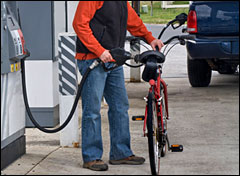Dear Umbra,
A couple of your recent columns have been about this novel idea of biking as the end-all in green transportation, but how green is biking, especially when you go out to buy a new one? If you switch to biking as the main source of transportation, you will be rewarded with the fantastic extra energy only exercise can bring, but won’t you need to consume more calories? And if you eat more meat as a result of all the wonderful exercise, aren’t you eventually going to add more carbon to your footprint? Also, aside from a homemade bamboo bike, isn’t the bicycle manufacturing industry pretty dirty? I ask this because I have increased my bike commute over the last months, and have become a hungrier commuter than I used to be. I also bought a new bike to better suit my needs during my 20-plus-mile round-trip commute. How long will my newfound transportation take to become less of a carbon source than my car or my B20-burning local bus?
Parker
Seattle, Wash.
Dearest Parker,
Hey, hey, let a person be a little enthusiastic about bicycling every once in a while. Normally, I hardly get any questions about bikes unless I prime the pump. What is there to ask — bikers are usually pretty darn happy, and low on the guilt burden. But we have indeed seen a burst in biking questions lately. So let’s be happy about biking, and let me say this: I think your bicycle was less of a carbon source than your car before you rode it once.

Shall I compare thee to an SUV?
In these situations, one can get all bogged down in math. That’s why I called in my pal Mr. Carbon Consultant to help me out.
Mr. CC and I went crazy on the math, using numbers from the Carnegie-Mellon Economic Input-Output Life Cycle Assessment model. In the EIO-LCA model (not to be confused with the EIEIO model), one can determine the environmental impacts of a manufacturing sector, by dollar of value. Briefly — because this could otherwise make for a long, dry article — bicycles produce 0.912 metric tons of carbon equivalent per $1,000 of manufacturing costs, and cars produce 0.628 MTCO2E per $1,000. So mayhap bike manufacture is dirtier per thousand dollars, but it’s certainly not dirtier per bike than it is per car, when we look at the total value of each. Which means your bike is already far less of a carbon source than your car when it comes off the assembly line — and that’s not even touching tailpipe emissions, the impacts of gas exploration, and so forth. I claim writer’s privilege and do not want to deal with the bus right now, as it’ll make the answer too long; but seeing that buses are also big, metal, expensive machines, I think we can guess where their EIO-LCA number would fall on a manufacturing basis alone.
As to the problem of a hearty cyclist’s increased caloric intake and the greenhouse gases associated with meat production, we can neatly sidestep this one. You obviously are hyper-aware of the urgent climate change problems facing us all, and the high emissions connected to meat production. Good for you! So why would you make all that effort to reduce your carbon footprint by bicycling, yet add more meat to your diet? And why would you improve your fitness and overall health by biking 20 miles a day, then eating four steaks? Don’t eat more meat. It’s not good for your health and it’s not good for the planet. The amount of meat you already eat is enough. If you must add foods due to your insatiable bike-derived hunger, let them be vegetable-based.
This reasonable answer may not satisfy your hunger for data, I know, so Mr. CC helped me with a bit more math on your behalf. We took numbers from a recent document by the Pacific Institute addressing the folderol about meat-based walking potentially producing more greenhouse-gas emissions than driving. Mr. CC figures that on a 100 percent ground beef diet (bleagh), a person driving a car emits 730 kilograms of carbon equivalent per 1,000 miles, while a cyclist will emit 410 kg over the same distance. More reasonably, if the person is fueled by the typical American diet, those emissions shift to 670 and 87, respectively. Certainly these are ballpark calculations, but they support the inclination of logic as regards these matters.
All this to say, biking is still great. Hooray.
Spokily,
Umbra


